#Bernard Rebel
Explore tagged Tumblr posts
Text

Bernard Rebel and Dickie Owen in The Curse of the Mummy's Tomb (1964)
#the curse of the mummy's tomb#dickie owen#bernard rebel#1960s horror#1960s movies#1964#michael carreras#hammer films#hammer horror
64 notes
·
View notes
Text



W A T C H I N G
#THE CURSE OF THE MUMMY'S TOMB (1964)#Terence Morgan#Ronald Howard#Fred Clark#Bernard Rebel#Jeanne Roland#George Pastell#Jack Gwillim#John Paul#Dickie Owen#Michael Ripper#HAMMER FILMS#hammer horror#ANCIENT EGYPT#WATCHING#horror
2 notes
·
View notes
Text

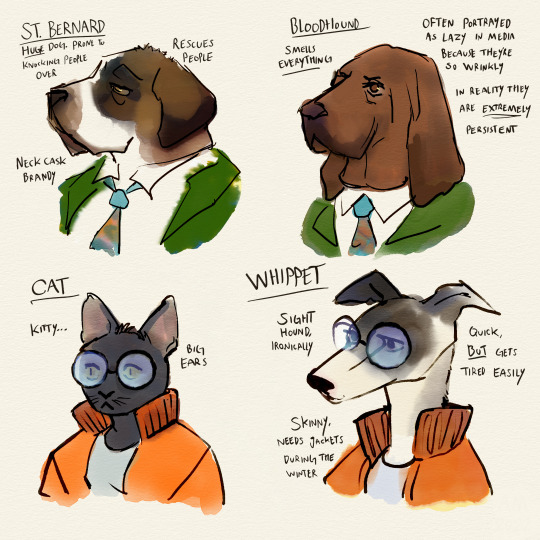
Experiments done in Rebelle. My friend said they look like an underground Soviet cartoon and now that's all I can see
#disco elysium#kim kitsuragi#harry du bois#furry#rebelle#mine#St Bernards are as far as i can tell not used as cop hounds because they're not violent enough#bloodhounds aren't particularly violent but are great at sniffing#the impression i wanna give here is that Kim is fast but Harry has higher stamina#fanart
461 notes
·
View notes
Text


“Made of Stone” by The Stone Roses vs. “Daddy’s Speeding” by Suede
“Made of Stone” hails from The Stone Roses’ self-titled debut in 1989, and is a synthesis on the death of the artist Jackson Pollock, whose art had a significant impact on the aesthetic vision of the album. The album is an early classic of the Baggy/Madchester era, an early era of alternative dance music in Manchester in the UK with a heavy emphasis on drugs.
“Daddy’s Speeding,” conversely, depicts the death of James Dean and how his tragic passing was mandatory for the building of his legacy and the image he came to inspire. It hails from Suede’s sophomore album, Dog Man Star, which turns away from the anthemic-rock style of their own self-titled debut, in exchange for a pessimistic and hedonistic sound and outlook expressing the frustrations of the lifestyle that the band was living in. Dog Man Star is a personal favorite from the 90s Britpop era (released in 1994), which was heavily inspired by the preceding Baggy era.
The parallels between these songs, and the implications of the crashes they are about, are impossible to ignore.
#britpop#the london suede#suede band#suede#brett anderson#bernard butler#dog man star#the stone roses#john squire#ian brown#i wanna be adored#made of stone#baggy#madchester#james dean#rebel without a cause#jackson pollock
11 notes
·
View notes
Text
Chapter 5: The Hangar
As they made their way up a level, they saw everyone around them rushing to their posts. Finn was somewhat at a loss for what to do. But Bernard, Rose, and Poe knew their duties, and headed straight for the hangar.
Along the way, Bernard and Rose split off from the others. They cut through a maintenance area, rather than follow the main hallways—a shortcut known only to the ground crew. They easily arrived before Poe, and began prepping the X-Wings for flight.
A few minutes later, Bernard finished his check on the first X-Wing. He began to move on to the next. However, as he made his way there, he happened to glance at the hangar exit, which the X-Wings would've flown through in a minute or two.
"Well, now, wait a minute," he muttered to himself. "Looks like there's a fighter going out already, or… what is that…" His eyes suddenly widened as he realized what it was, and where it was heading. "TIE Fighter! Hey, there's a TIE Fighter coming!"
He tried to get the attention of the pilots, waving, pointing, yelling. "Come on, somebody open fire!" But the only pilot who noticed him simply cocked her head and looked confused. She couldn't hear him.
Bernard sighed in exasperation. He then headed over to one of the other X-Wings—the one Rose was working on. He grabbed her arm and, without explanation, ran with her towards some large, heavy equipment standing off to the side.
She tried to pull away. "Bernard, what are you doing?! I've got to—"
"Don't argue, there's no time!"
As soon as they were close enough, he pushed her behind the equipment. They barely made it in time. The TIE let loose two powerful blasts, which hit some fuel canisters. An explosion rocked the hangar. It was so powerful that, even sheltered by the equipment, the two were knocked unconscious by the blast.
Rose came to first, minutes later. She couldn't see the destruction from her position behind the equipment, perhaps twenty feet from the wall. But the smoke tipped her off that something was very wrong. The young woman peered around the side and gasped. The hangar was in flames. Most of the X-Wings were incinerated by the blast, and not one living soul was in sight.
Rose heard the sound of groaning behind her, and turned around. Bernard was lying on his back, trying to get up. She rushed back and helped him sit up, but as soon as he was upright, he swatted her hands away. "Stop fussing! I'm fine!" He shook his head quickly, and put his hand to the side of it. "I think. Hoo… How about you, though? All in one piece, looks like?"
"Yeah, I'm okay." Rose looked down, perhaps a little awkwardly. "You saved my life, you know that?"
He was silent for a moment. "Yeah, well… don't let it get around." Then he smiled a little.
Barely audible over the flames, they heard the sound of coughing, coming from somewhere in the hangar.
"You hear that?" Rose asked.
"Yeah, looks like we're not the only ones still kicking. Come on, they probably need help. Let's go find them." They got to their feet and Bernard started to go.
"Bernard?"
"Yeah?"
Rose smiled. "Thanks."
"Ehh, you're welcome," he shrugged. "Now, let's get going already."
[Title Crawl]
[Previous; Next]
#adventures in odyssey#aio#bernard walton#the last janitor#Leadership of the Resistance#Rebel Flotilla plotline#the last jedi#salt and light
4 notes
·
View notes
Text
Thank You Bernard Sumner for those words which are a Daily Affirmation for me "Be A Rebel, not a devil"
2 notes
·
View notes
Text

0 notes
Text
I love this show so much, like I haven't been this excited about Star Wars (or anything else for that matter) in a while, but these contacts are just not it.
I've mostly warmed up to Ahsoka's, I might just keep thinking Ezra is blind, but it's taking a lot to get over Hera's. They're just so bright and they make her stare so intense and empty. They remind me of when Tilda Swinton had black contacts as the White Witch and she literally couldn't see anything.
To quote Andy Bernard, "I'm so freaked out by eyes and things around eyes" I butchered that but it was a stupid character choice for that one single episode so it doesn't matter

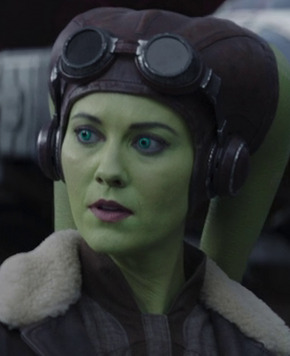

The unholy trinity of blue contact lenses
#and just like that#it's an office post#ahsoka tano#hera syndulla#ezra bridger#ahsoka#star wars#rebels#star wars rebels#ahsoka spoilers#eyes#contacts#uncanny valley#white witch#tilda swinton#narnia#the lion the witch and the wardrobe#andy bernard#things in eyes#eyes freak me out#the office
2K notes
·
View notes
Text

“Christian Palestinian rebel holding stones in his hands.”
Photographed by Bernard Bisson, 1988.
97 notes
·
View notes
Note
Romeo and Juliet for the character ask
Favorite thing about them:
Romeo: His tenderness and passion, and the sheer poetry with which he expresses them. Also, the fact that he's allowed to be tender, emotional, and "unmasculine" (not that he's as "effeminate" as disdainful pop culture sometimes claims he is, but still...), yet the narrative doesn't condemn him for it, and it hasn't stopped him from becoming the most iconic young lover of all time.
Juliet: Her own tenderness and passion which match Romeo's beat for beat, combined with intelligence, eloquence, and wit not often seen in an ingenue. Also, the fact that Shakespeare lets her be passionate and sexual and rebel against her parents, yet never frames her as a "loose woman" or "unmaidenly" for it, but keeps her a fully sympathetic heroine.
Least favorite thing about them:
Romeo: The killing of Tybalt. Despite every argument that can be made to justify it… even if honor and friendship demand nothing less after Mercutio’s death… the fact remains that he kills his new bride’s beloved cousin, and all the rest of the tragedy stems from that act.
Juliet: The selfish aspect of her choice to fake her own death: that she does it even though it means putting her parents and the Nurse through unimaginable pain. Not that I have much sympathy for her parents after the way they treated her, and after being abused by them and then betrayed by the Nurse, I understand why Juliet isn’t too concerned about their feelings. But I might have liked her to be a little more torn for their sake.
Three things I have in common with them:
*I can be passionate and melodramatic.
*I love deeply and intensely.
*I'm an only child.
Three things I don't have in common with them:
*I've never held a sword or dagger.
*I have a good relationship with my parents.
*I've never been suicidal.
Favorite line: How to choose?! All the most famous quotes, and basically everything else they say to and about each other.
brOTP:
Romeo: Mercutio and Benvolio.
Juliet: The Nurse until her betrayal.
OTP: Each other.
nOTP: Their parents or Friar Laurence.
Random headcanon:
Romeo: He's only fifteen, or maybe even fourteen. Not that I object to portraying him as sixteen or seventeen, but I do object whenever someone thinks he's in his twenties. In Juliet's speech looking forward to consummating their marriage, she believes that he's a virgin like herself, and unless we're meant to see her as being painfully naïve, that belief makes more sense the younger he is.
Juliet: Her wit and cleverness are partly thanks to the influence of the Nurse's witty husband, who was a strong, affectionate presence in her life when he was alive. As for how willing and eager she is to consummate their marriage, rather than shy and nervous like other girls her age might be... well, apart from her sheer passion for Romeo, that's the influence of the Nurse.
Unpopular opinion: I wish more critics would take their suffering seriously and not just view it as typical "teen angst." By this I don't just mean haters, but critics who sympathize with them too. I'd like to see people view Romeo's mental health, and its neglect by his family and friends, as more of a real concern, rather than just labeling him (either disdainfully or affectionately) as a melodramatic, impulsive teenager. Ditto for Juliet's dysfunctional relationship with her parents and Romeo's lack of communication with his, rather than just saying "All teens fight with/rebel against/feel unable to confide in their parents." It takes more than that to drive two young people to suicide!
Song I associate with them:
Romeo:
"Ah! Léve-toi, soleil!" from Charles Gounod's opera Roméo et Juliette.
youtube
Juliet:
"Ah! Je veux vivre" from Gounod's opera.
youtube
Both:
Nino Rota's main theme from the Zeffirelli film (a.k.a. "What Is A Youth?" or "A Time For Us"):
youtube
Tchaikovsky's "Fantasy Overture":
youtube
And their various love duets from Gounod's opera.
Favorite picture of them:
The iconic painting by Frank Bernard Dicksee.

This painting by John Henry Frederick Bacon.

Their lifeless bodies in Frederic Leighton's painting of the final scene.

Leslie Howard and Norma Shearer in the 1936 film – too old, yes, but I have to honor them because they served as prototypes for Disney's Snow White and her Prince.


Laurence Olivier and Vivian Leigh, 1940.

John Stride and Judi Dench (yes, she was young once), 1960.

Leonard Whiting and Olivia Hussey in the 1968 Franco Zeffirelli film.






Leonardo DiCaprio and Claire Danes in the 1996 Baz Luhrmann film.



Adetomiwa Edun and Ellie Kendrick, Globe Theatre, 2009.

Orlando Bloom and Condola Rasheed, Broadway, 2014.

The Prince and Cinderella Richard Madden and Lily James, West End, 2016.


Rudolph Nureyev and Margot Fonteyn in Prokofiev's ballet, 1966:

Some other images from Prokofiev's ballet:


From Ian Judge's LA Opera production of Gounod's opera: the opera has Romeo still alive when Juliet revives, so they die together, and Judge's staging features this poignant final tableau, where they feebly reach for each other's hands just before they expire.

@ariel-seagull-wings, @thevampiricnihal, @cto10121, @giuliettaluce
#character ask#romeo and juliet#william shakespeare#romeo montague#juliet capulet#ask game#tw: death#tw: suicide
16 notes
·
View notes
Text






12th June 1997 saw The island of Eigg pass into community ownership when it was purchased by the Eigg Heritage Trust.
After years of instability, neglect and lack of secure tenure, the Isle of Eigg Heritage Trust was able to purchase the island on, largely due to the generosity of around ten thousand members of the general public
The Hebridean island of Eigg is second to St Kilda as the most famous of the smaller Scotttish isles. While St Kilda is renowned for its extinction as a place of human settlement, Eigg is celebrated for its rebirth. After overthrowing its eccentric, authoritarian owner two decades ago, this 31 sq km (12 sq mile) patch of moor and mountain was reborn as what is sometimes mockingly called the People’s Republic of Eigg.
This triumph of David versus Goliath has forged an apparently inspirational, sustainable community of 100 people.
A series of owners tried unsuccessfully to run some sort of business on Eigg during the latter part of the 20th century, from the Welsh Farmer whose Hereford cattle promptly died of bracken poisoning. Disheartened, he got rid of Eigg for £110,000 in 1971 to Bernard Farnham-Smith, self-styled naval commander, head of an English charity that wanted to run the island as a school for disabled boys, by 1973 the Eigg’s own school had only one pupil. Rather more successful was eccentric Keith Schoenberg, a dashing, Yorkshire-born businessman and former Olympic bobsleigher, acquired Eigg.
He was a charming, persuasive adventurer, who, over the next 20 years endeared himself to the guests by allowing them to perch on the running board as he drove them to beach picnics or moonlit games of hockey. One failed marriage after the other ended with him reluctantly having to sell the island in 1992 in his divorce settlement, in a surprise move he ended up bidding and became sole owner of Eigg, this didn’t go down well with the Islanders who were tiring of him, culminating in a fire in sheds on Eigg’s pier, with Schellenberg’s Roller inside. Police arrived but noone was ever brought to justice for the arson attack, maybe the Polis were just happy to get off the island alive rather than ending up in a wooden effigy atop a bonfire! “It was once the laird’s factor [his estate manager] who went about burning people out. Now it seems OK to burn out the laird himself,” fumed Schellenberg.
By 1995 he had enough and put the island up for sale, but refused to sell to the population, it should really be of no surprise that the knew owner seemed more eccentric than the previous one, self style Professor Gotthilf Christian Eckhard Oesterle was a fire-worshipping German artist and self-styled “professor” who went by the name of Maruma having read the new name in a pool of water in Geneva.
He declared it was impossible to own Eigg and vowed to improve opportunities for the community, build a swimming pool, and replace the dirty diesel generators that provided electricity with an integrated system of wind and solar power. The press discovered that, unfortunately, Maruma was not quite what he seemed: he was unknown in the art world, he wasn’t a proper professor, and he had used Eigg as security for a £300,000 loan at a punitive 20% interest rate. He promised to remove the island’s rusty old cars, but a pile of wrecks soon accumulated by the pier: locals dubbed it “the Maruma centre”. In July 1996, the island was put up for sale again, at an inflated price of £2m.
The Islanders Trust rthrew themselves into raising the asking price. . The story of the islanders who wanted to buy their own island was portrayed as a jolly romp in the style of Compton Mackenzie’s Whisky Galore, in which Hebridean islanders rebel against British bureaucrats. Eigg folk didn’t particularly relish this stereotype, but it captured imaginations and raised money.
Donations began flowing in at the rate of £1,000 per post bag; soon it was £30,000 per bag. Concerts took place in Edinburgh, Glasgow, Tyrone – and even Detroit – to raise funds. A mystery benefactor, a woman from northern England whose identity remains secret. gave £900,000. Most donations came from England. Outsiders were shocked by the feudalism that the islanders endured – the owners even decided which of them, if any, could eat Eigg’s seaweed – and worried about the possible fate of its pristine environment. The wildlife trusts, including the Scottish Wildlife Trust, were particularly effective at mobilising their members to help Eigg.
Meanwhile, the island’s Trust feared that Maruma’s German estate agent would sell Eigg to another international client. The agent described the Scottish islands on his books as “the Van Goghs” of 120 personally inspected paradises: “There is a sense of romance in buying islands. It is the ultimate purchase you can make, a complete miniature world of which you can be king.” Maruma’s creditor, a German clothing exporter, finally put the islanders out of their misery. After Maruma defaulted on his £300,000 loan, the creditor used the Scottish courts to force Eigg’s sale. His solicitors accepted the islanders’ offer of £1.5m on 4 April 1997. Finally, the people of Eigg owned their island.
Eigg has been hailed as Scotland’s most Eco-Friendly Island and the community trust are doing a great job of running a successful business, which includes offering accommodation, courses and working holidays for volunteers, you can read more about the Island on their website here. http://www.isleofeigg.org/
21 notes
·
View notes
Text

Uhtred's Feast, Bernard Cornwell
My name is Uhtred. I am the son of Uhtred, who was the son of Uhtred and his father was also called Uhtred . . .
The Last Kingdom is one of the most successful historical fiction series of our time. The novels tell the epic story of the birth of England and introduces one of the greatest ever fictional heroes: the iconic Uhtred of Bebbanburg, the Saxon-born, Norse-raised warrior and rebel. In this lively compendium, Bernard Cornwell revisits Uhtred’s realm, illuminating elements of the Anglo-Saxon world he couldn’t fully explore in his novels.
Uhtred’s Feast offers rich background on the books of the Last Kingdom series, presenting a fascinating, detailed view of Anglo-Saxon life in all its splendor, danger, and beauty. With his narrative flair, Cornwell explores every aspect of this historical period, from the clothes to weapons to food, offering beautifully crafted recipes of early Anglo-Saxon fare, created by renowned UK chef Suzanne Pollak. In addition, he has written three new stories exclusive to this book that reveal the man behind the shield—Uhtred as a young boy, as Alfred’s advisor, and as prince.
#tlk#bernard cornwell#bought this today because#apparently#I ENJOY CRYING#over Uhtred and Alfred#(please let Alfred be more than a footnote presence in this)#the last kingdom#suzanne pollak
8 notes
·
View notes
Text

HELLWITCH: FORSAKEN no.1 • Heavy Metal Edition • cover art • Jonboy Meyers [Nov 2020]
To avenge her murdered lover, Hellwitch slaughtered a queen and burnt her own hive to the ground. Now she has become Hell's most notorious rebel, with a price on her head to match. Forced to wander the wastelands, Hellwitch finds herself hunted by old enemies. They will stop at nothing to finish her and butcher the last survivors of her hive. Can Hellwitch defeat her ruthless adversaries? Or will a twisted rival from her past annihilate Hellwitch's very soul?
(w) Brian Pulido, Mike MacLean • (a) Diego Bernard • (colorist) Ceci de la Cruz • (ca) Jonboy Meyers
Comic • 49 pages • $7.99 US
#HELLWITCH: FORSAKEN no.1#Jonboy Meyers#Brian Pulido#Mike MacLean#Diego Bernard#Ceci de la Cruz#Heavy Metal Edition#Hellwitch: Forsaken#Hellwitch
18 notes
·
View notes
Text
Van Gogh's Letters
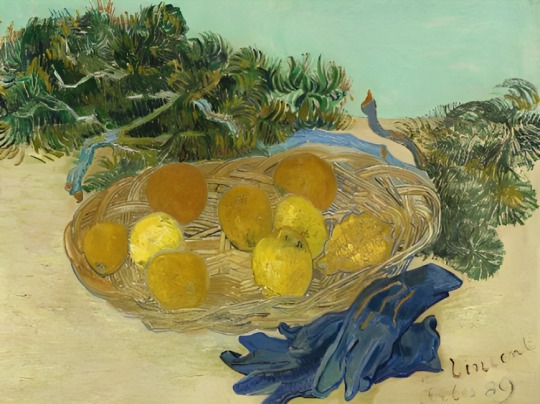
[To Theo van Gogh. Arles, 20 May 1888]
We no longer rebel against things, we’re not resigned either — we’re ill and it’s not going to get any better — and we can’t do anything specific about it. I don’t know who called this condition being struck by death and immortality. The cab we drag along must be of use to people we don’t know. But you see, if we believe in the new art, in the artists of the future, our presentiment doesn’t deceive us. When good père Corot said a few days before he died: last night I saw in my dreams landscapes with entirely pink skies, well, didn’t they come, those pink skies, and yellow and green into the bargain, in Impressionist landscapes? All this is to say there are things one senses in the future and that really come about.
And we, who, I’m inclined to believe, are by no means so close to dying, nevertheless feel the thing is bigger than us and longer-lasting than our lives.
We don’t feel we’re dying, but we feel the reality of the fact that we’re not much, and that to be a link in the chain of artists we pay a steep price in health, youth, freedom, which we don’t enjoy at all, any more than the cab-horse that pulls a carriage full of people who, unlike him, are going out to enjoy the springtime. Well then — what I wish you as well as myself is to succeed in recovering our health, because we’ll need it. That Hope of Puvis de Chavannes is such a reality. There’s an art in the future and it will surely be so beautiful and so young that, really, if at present we leave it our own youth, we can only gain in tranquillity. Perhaps it’s too silly to write all this, but it’s what I felt; it seemed that like me, you suffered to see your youth going up in — smoke — but if it comes back and appears in what we do, there’s nothing lost, and the power to work is a second youth. So be serious about getting better, because we’ll need our health. I shake your hand firmly, and Koning’s too.
Ever yours,
Vincent
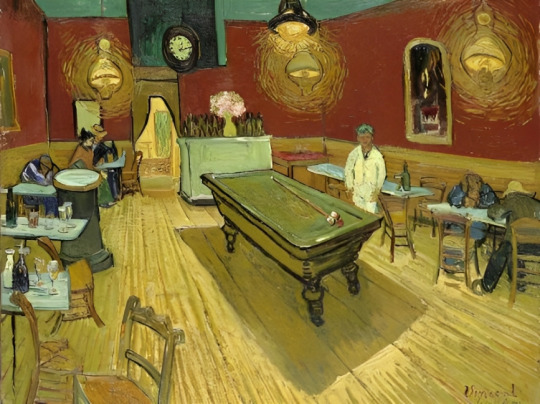
[To Emile Bernard. Arles, Sunday, 18 March 1888]
My dear Bernard,
Having promised to write to you, I want to begin by telling you that this part of the world seems to me as beautiful as Japan for the clearness of the atmosphere and the gay colour effects. The stretches of water make patches of a beautiful emerald and a rich blue in the landscapes, as we see it in the Japanese prints. Pale orange sunsets making the fields look blue – glorious yellow suns. However, so far I’ve hardly seen this part of the world in its usual summer splendour. The women’s costume is pretty, and especially on the boulevard on Sunday you see some very naive and well-chosen arrangements of colour. And that, too, will doubtless get even livelier in summer.
I regret that living here isn’t as cheap as I’d hoped, and until now I haven’t found a way of getting by as easily as one could do in Pont-Aven. I started out paying francs and now I’m on francs a day. One would need to know the local patois, and know how to eat bouillabaisse and aïoli, then one would surely find an inexpensive family boarding-house. Then if there were several of us, I’m inclined to believe we’d get more favourable terms. Perhaps there’d be a real advantage in emigrating to the south for many artists in love with sunshine and colour. The Japanese may not be making progress in their country, but there’s no doubt that their art is being carried on in France. At the top of this letter I’m sending you a little croquis of a study that’s preoccupying me as to how to make something of it – sailors coming back with their sweethearts towards the town, which projects the strange silhouette of its drawbridge against a huge yellow sun.

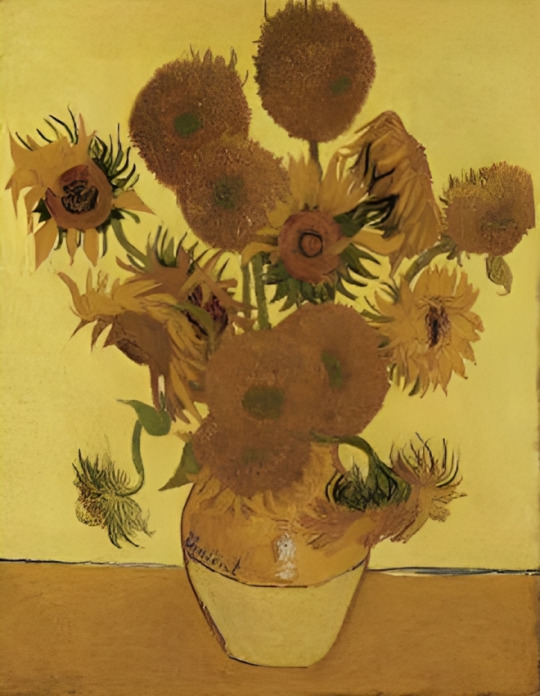
[To Theo van Gogh. Arles, Friday, 4 January 1889]
My dear brother
I hope that Gauguin will also completely reassure you a little regarding painting matters. I expect to start work again soon. The charwoman and my friend Roulin had taken care of the house, put everything in good order.
When I come out I’ll be able to continue on my way here again, and soon the fine days will come and I’ll start on the orchards in blossom again.
I am, my dear brother, so heartbroken by your journey, I would have wished that you’d been spared that, for all in all no harm has come to me, and it wasn’t worth troubling you.
I can’t tell you how much it delights me that you’ve made peace and even more than that with the Bongers. Say so on my behalf to André, and give him a very cordial handshake from me.
What wouldn’t I have given for you to see Arles in fine weather, now you have seen it when it’s dark. However, be of good heart, send the letters directly to me, place Lamartine. I’ll send Gauguin the paintings of his that are still at the house as soon as he wishes. We owe him the money he spent on the furniture.
Ever yours,
Vincent

[To Theo van Gogh, The Hague, 11 July 1883]
My aim is to do a drawing that not exactly everyone will understand, the figure expressed in its essence in simplified form, with deliberate disregard of those details that aren’t part of the true character and are merely accidental. Thus it shouldn’t, for example, be the portrait of Pa but rather the type of a poor village pastor going to visit a sick person. The same with the couple arm in arm by the beech hedge — the type of a man and woman who have grown old together and in whom love and loyalty have remained, rather than portraits of Pa and Ma, although I hope they’ll pose for it. But they must know that it’s serious, which they might not see for themselves if the likeness isn’t exact.
And should be a bit prepared, in the event that this happens, for having to pose as I say and not change anything. Well, that will be all right, and I don’t work so slowly as to make it a great effort for them. And for my part I would greatly value doing it. Simplifying the figures is something that very much preoccupies me. Anyway, you’ll see some for yourself among the figures I’ll show you. If I went to Brabant, it should certainly not be an excursion or pleasure trip, it seems to me, but a short period of very hard work at lightning speed. Speaking of expression in a figure, I’m becoming more and more persuaded that it lies not so much in the features as in the whole manner. I find few things as horrible as most academic facial expressions. I would rather look at ‘Night’ by Michelangelo, or a drunk by Daumier, or The diggers by Millet, and that large woodcut by him, The shepherdess. Or at an old horse by Mauve &c.
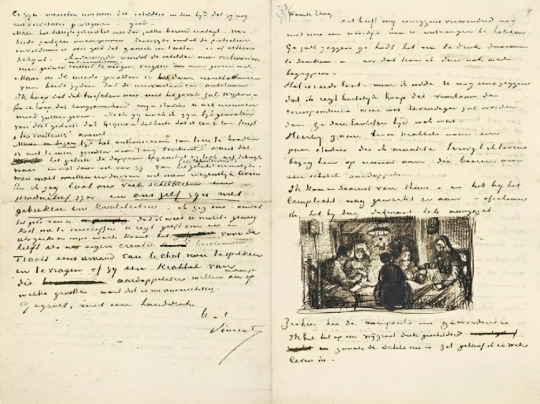
The Letters of Vincent Van Gogh by Vincent Van Gogh // Still Life of Oranges and Lemons with Blue Gloves, 1889 by Vincent van Gogh // The Night Cafe by Vincent van Gogh // The Cafe Terrace on the Place du Forum, Arles, at Night, c.1888 by Vincent van Gogh // Still Life, Vase With Fifteen Sunflowers by Vincent van Gogh // van Gogh's Orchard in Blossom (Plum Trees) // Letter from Vincent Van Gogh to His Brother Theo
Franz Kafka's Letters to Milena
#vincent van gogh#letters#oil paintings#artwork#painting#books & libraries#dark academia#light academia#spilled ink#moodboard#spilled thoughts#words words words#post impressionism#web weaving#correspondence
40 notes
·
View notes
Text
☀️ RULES: post 5 songs associated with your oc, followed by 3 outfits they would wear 🫶
Thanks for the tag, @pursuitseternal! Some of you have already been tagged for this probably but I tag @phaseeternal, @kaeoticneutral, @tripleyeeet, @starryjuicebox and @muspelbitter to do this with your own OCs if you want to!
I’ll definitely do this for my self-insert OC, Alyx! She’s a Way of the Open Hand monk Mephistopheles tiefling who enjoys smutty books, spiders and rats and lives up to her whole 8 intelligence daily.


Her songs:
Her outfits (one of which I actually own and frequently wear irl):



14 notes
·
View notes
Text
2024 List of Books Read
This year has a “when in Rome” vibe and I was in Ireland. Also may have forgotten to write a couple.
Irish Superstitions Daithi O’Hogain
This Road of Mine by Seosamh Mac Grianna translated by Micheal o hAodha
Babel by RF Kuan
16 Lives: Thomas MacDonagh Biography by Shane McKenna
16 Lives: Joseph Mary Plunkett Biography by Honor O’ Brolchain (who I met several times wonderful woman and i love what her and her family does for disability activism in Ireland)
Authority Jeff Vandermeer
Tales of Gravity Falls (graphic novel)
Book of Bill (BN edition)
Magic Fish (graphic novel) Trung Le Nguyen
Black is the Body by Emily Bernard
Lies My Teacher Told Me (graphic novel) by James W. Loewen, Illustrated by Powell
Goddess of the River Vaishnavi Patel
Rebel Sisters Colon-McKenna
Now I’m still working through Absolution and a book on Palestine. Theres also Weight of a Feather a poetry collection by Stephanie Ní Thiarnaigh I have dipped in and out of. But on my mind is collective action and resistance which at the moment being isolated what it even means.
2 notes
·
View notes